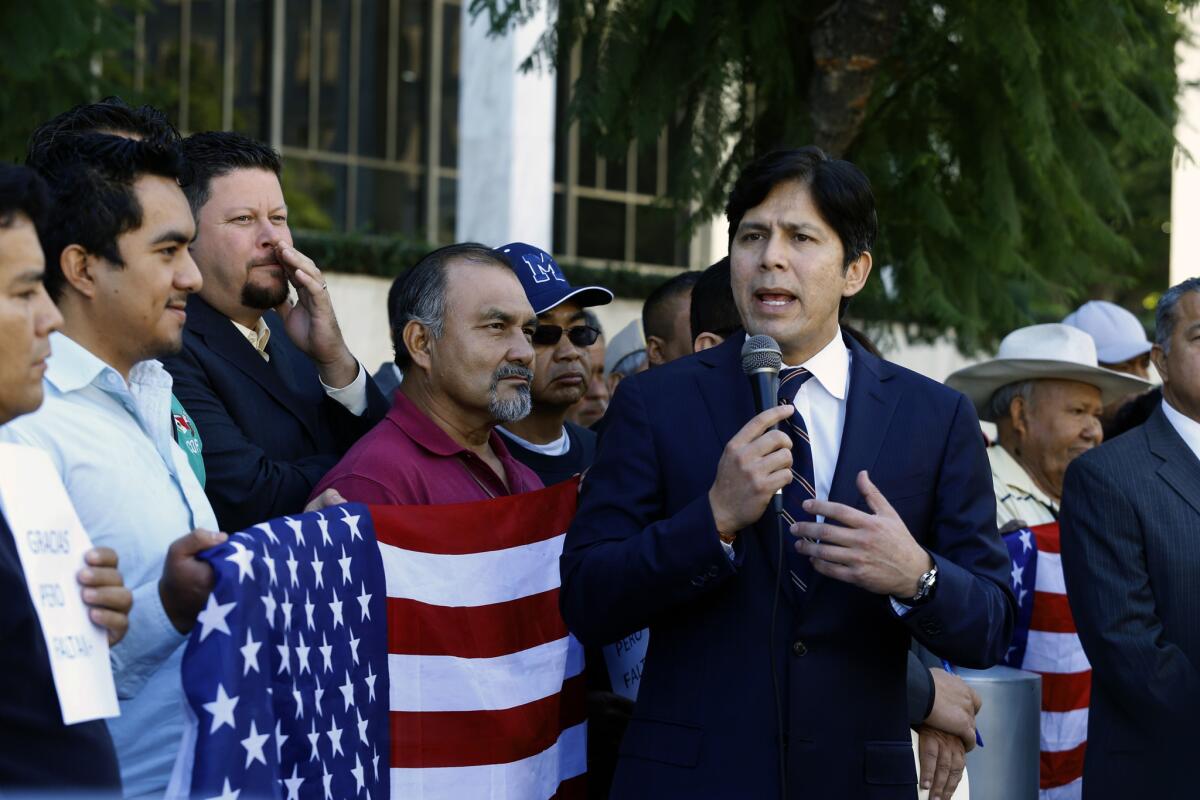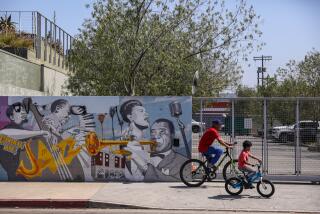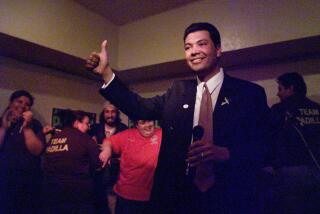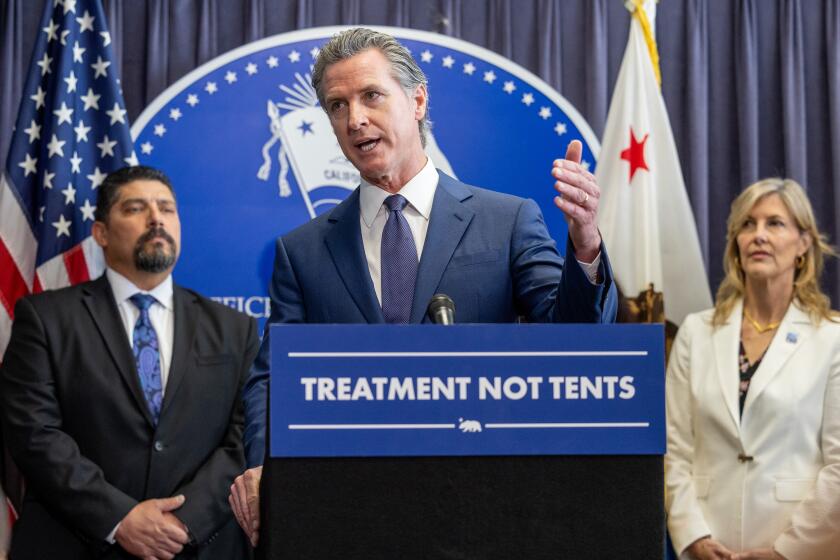Analysis: Once aided by courts, can Latino politicians survive Supreme Court act?

State Sen. Kevin de Leon, the top ranking Latino legislator in California, speaks at a immigration rally last November in downtown Los Angeles.
The U.S. Supreme Court’s unexpected decision to take up a Texas voting case poses perhaps the most acute threat in a generation to Latino political strength in California. But how much of the threat actually materializes is decidedly less known.
In a situation rife with questions, one of the most ironic is this: Have Latino politicians, whose success was helped along by supportive court actions decades ago, become so ubiquitous that they can succeed regardless of new court decisions that might otherwise lessen their strength?
The Texas case was brought by plaintiffs who want only citizens to be counted in the crafting of voting districts; currently, all residents are counted, which boosts the number of districts in places like Southern California. Were the plaintiffs to succeed, many urban districts would not retain enough viable constituents to exist on their own. The court’s decision, which covers state and local elections but could be expanded to include congressional districts, will not be announced until early next year.
Under the worst-case scenario for Latinos who hold huge sway over politics in California, a court decision siding with the plaintiffs could force multiple Latino districts to collapse together, or to be merged with areas dominated by other types of voters. In theory, that could force titanic clashes between existing Latino players -- or between Latinos and other minority groups -- with some of them falling aside.
In broad strokes, a judgment for the plaintiffs could move political power from California’s urban areas to its suburbs -- spreading it from Los Angeles proper to suburban environs like Orange County and the Inland Empire where citizenship rates are higher. Power could also spread from noncitizen-heavy Southern California to Northern California.
“From the nonwhite, to the white,” said David Wasserman, an analyst for the nonpartisan Cook Political Report.
But much remains up in the air, including the most obvious: both the direction of the court’s judgment and the breadth of it -- how it might want constituents to be counted under any new arrangement.
If the court moves in a way that curbs Latino power, political strategists predict the same sort of backlash that greeted Republican efforts in 1994 to pass Proposition 187, the measure that would have blocked benefits to noncitizens. Anger over its passage is credited with a massive and continuing effort to register Latinos to vote -- and vote Democratic. The result has been a near-gutting of Republican power in California.
“What we know, based on what happened in the ‘90s, you can bet your sweet bippy there’ll be a ton of money to organize and register Latinos,” said Bruce Cain, a Stanford political science professor and long-time observer of California politics. “This could be a spur to mobilization in the Latino community. … Adversity mobilizes people.”
Adversity, and the threat of court action, has made for breathtaking change when it comes to Latino power in California. Much of it rested on legal fights over long-standing efforts to dilute the power of Latino voters by breaking them into multiple districts.
It was only in the late 1980s that the Los Angeles City Council crafted a district specifically to answer a U.S. Justice Department lawsuit that charged it had left Latinos under-represented in city government. (Then-Assemblywoman Gloria Molina soon was elected the council’s first Latina member.)
And it was in early 1991 that a new Los Angeles County supervisors’ district was drawn up on the orders of a U.S. district judge who said the board had intentionally discriminated against Latinos when drawing district boundaries. (Molina won that seat too, becoming the first Latina and first woman elected to a board seat.)
With that -- and with persistent legal pressure, population growth and tenacity -- the numbers began to move here and throughout California.
Statistics kept by the National Assn. of Latino Elected Officials show that 460 Latinos held office in California in 1984. A decade later -- the year of Proposition 187 -- that number had grown to 796. Last year, 20 years later, there were 1,370 elected Latinos, including nine members of Congress, 27 legislators and 420 county and city leaders. (The number of Los Angeles council members has gone from two at Molina’s election to five now.)
Four Latinos have served as Assembly speaker since 1996. The current state Senate leader is Los Angeles’ Kevin DeLeon. The secretary of State is former state Sen. Alex Padilla of Pacoima. Rep. Loretta Sanchez of Orange County is running for the U.S. Senate; former Los Angeles Mayor Antonio Villaraigosa is pondering a run for governor in 2018.
The integration of Latinos into the state’s political structure means that components necessary for broad success -- access to money and influential benefactors, familiarity and comfort among voters -- now exist for them, or at least many of them.
There is no doubt that a court decision against Latino political interests would wound some. A voter profile released by the Public Policy Institute of California last fall said that likely Latino voters in 2014 represented 17% of the state’s electorate, half the percentage of Latinos in the state. Some of the missing are eligible to vote but don’t -- they would be the targets of a registration campaign -- but many of them are not citizens and would effectively disappear from the districts under a plaintiff’s court judgment.
Still, the court cases of the 1980s and 1990s were premised in part on the notion that Latinos would only be elected if their voters were marshaled into one district in which they were the strong majority. But all these years later, that is not necessarily the case.
Padilla, for example, won 3.8 million votes en route to victory in November. A second first-time state office seeker, Betty Yee, won about 10,000 votes more as she claimed the office of state Controller. Padilla’s biggest problem in his narrow victory was winning the votes of Latino Southern California, where turnout is far lower overall than in Yee’s Northern California base.
Much confidence can come from past success and the fact that Latinos are no longer wholly shut out of office, as they were for decades. But they are also not elected in the same proportion as white politicians. A court decision against Latino districts would tread harshly on slights buried only recently, and cut into gains that are so new, and were so hard fought.
“The big picture is that now that Latinos have come over the threshold and have elected speakers and statewide officials to office and big city mayors, they now just become another interest group in the scheme of things, that competes with other interest groups?” said Stanford’s Cain.
“The bottom line is that Latinos are nowhere near the [elected] level of what they have in the population, just as women are nowhere near their levels of the population, and that always is both symbolically and substantively problematic.”
For political news and analysis, follow me on Twitter: @cathleendecker . For more on California politics, go to latimes.com/decker.
More to Read
Start your day right
Sign up for Essential California for news, features and recommendations from the L.A. Times and beyond in your inbox six days a week.
You may occasionally receive promotional content from the Los Angeles Times.







